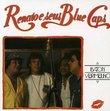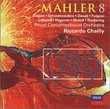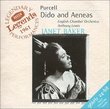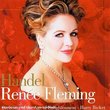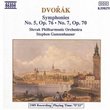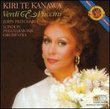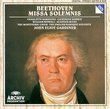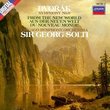| All Artists: Giacomo Puccini, Colin Davis, Orchestra of The Royal Opera, Ann Murray, Domenico Trimarchi, Ingvar Wixell, José Carreras, Montserrat Caballé, Piero de Palma, Samuel Ramey, William Elvin Title: Puccini: Tosca Members Wishing: 1 Total Copies: 0 Label: Philips Release Date: 8/10/1993 Genre: Classical Style: Opera & Classical Vocal Number of Discs: 2 SwapaCD Credits: 2 UPC: 028943835923 |
Search - Giacomo Puccini, Colin Davis, Orchestra of The Royal Opera :: Puccini: Tosca
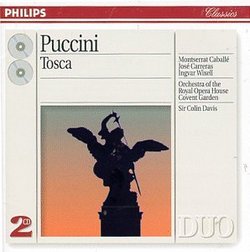 | Giacomo Puccini, Colin Davis, Orchestra of The Royal Opera Puccini: Tosca Genre: Classical
José Carreras recorded Tosca twice in the 1970s--his best years--but his voice was much better for Colin Davis when recording this set in 1976 than it was for Herbert von Karajan's 1979 interpretation. And Davis's con... more » |
Larger Image |
CD DetailsSynopsis
Amazon.com essential recording José Carreras recorded Tosca twice in the 1970s--his best years--but his voice was much better for Colin Davis when recording this set in 1976 than it was for Herbert von Karajan's 1979 interpretation. And Davis's conducting is also better. It would be nearly ideal if Ruggero Raimondi could be transferred from the von Karajan set (and perhaps Katia Ricciarelli; tastes differ on Montserrat Caballé's Tosca). In any case, for Carreras fans, this is the Tosca to have. --Joe McLellan Similar CDs
Similarly Requested CDs
|
CD ReviewsOne word - divine! tenor_in_training | 01/07/2000 (5 out of 5 stars) "The word "divine" really comes close to describing this wonderful recording. All the artists here are in their glorious prime, their singing and acting is nothing short of sensational. Caballé's Tosca is literally "to die for" and José Carreras' Cavaradossi is a perfect match for her. I've heard many recordings and live performances of Tosca, but never have I heard anything like this. Their voices and emotions are almost unbelievably good, just pick any moment in the opera to see what I mean. The arias from this opera became their signature pieces, they sing them often in concerts and on other recording, but for the sheer glorious beauty of sound turn to this recording. I wholeheartedly agree with the reviewer below who boldly stated that this recording surpasses the famous Callas/Di Stefano set. While Caballé differs from Callas substantially in terms of vocal range and interpretation (you would want to hear both), Carreras sounds similar to Di Stafano, only stronger, prettier and more involved. The darker coloring of his voice adds a lot. He adds an interesting twist to his Cavaradossi - he acts strongly upon his emotions, yet realizing that he is a weapon in the hands of fate, whose arrival is announced by Angelotti (sang by Samuel Ramey, no less!). Unlike the typical, lost-in-dreams and even narcissistic Mario, he conveys the sense of inevitable fate brilliantly from the very beginning, as he paints the image of his beloved "Dammi i colori... Recognita Armonia." Tosca is often sang by spinto sopranos (Marton, Scotto), but Caballé managed to defy this presumption. Her beautiful bel canto voice is able to convey the depth of Tosca's character - while she is obviously a "prima donna" in every sense, she allows passions to rule her life and dictate her actions, something a self-absorbed "diva" is normally not likely to do. Interestingly she is not afraid to allow a "break" into her voice for the powerful dramatic effect. Wixell is a good, solid, evil Scarpia, even though I usually like to hear tougher, suave, darker-voiced Scarpias, such as the one of Tito Gobbi's, Ruggero Raimondi's (on the Karajan set), or Renato Bruson's. I think Scarpia should carry an air of seduction, his character is one of the most fascinating ones ever created; Act II is totally his right up to Tosca's "Vissi d'arte" and Wixell proves that he is up to the challenge. Sir Colin Davis keeps action fast and gripping, after all, it should be a "little shocker." He would be a polar opposite to, say, Sinopoli or Karajan, who both like to emphasize the orchestral involvement and slow down the tempos quite a bit. Their sets are a "must hear" because they present "Tosca" under a completely different angle, which makes it only more interesting. One can't have too many interpretations of this magnificent opera. But this set should be definitely included in its top three recordings of this century. Philips has done an injustice to it by reducing it to the "Duo" series that omits the libretto and critical essays, but at the same time it created one irresistible deal." Glorious! D. MCGOVERN | New Zealand | 02/22/2002 (5 out of 5 stars) "If anyone ever required proof of Jose Carreras's claim to greatness, then this recording would surely suffice. Just 30 at the time, Carreras put his contemporaries to shame with this thrilling interpretation of Mario Cavaradossi. He is ably supported by Montserrat Caballe and Ingvar Wixell in the roles of Tosca and Scarpia, respectively, and the stirring conducting of Colin Davis. But it is Carreras who steals the show with his irresistible combination of vocal beauty and ardent delivery. Not for him the nasal, covered tone of a Domingo, or the blandness of a Pavarotti. This is the Cavaradossi that I imagine Puccini himself envisioned: headstrong, romantic and heroic, with both the voice and the commitment to drive an audience to distraction.I suggest that first-time listeners head straight to Track 7, Disc One for an immediate example of what I'm talking about. The impassioned "Qual occhio al mondo" is beautiful beyond compare, and those familiar with the score will note Carreras's outstanding breath control - without any of the customary sacrificing of beauty in this supremely difficult passage. It's an astonishing moment, and no one - not even Carreras himself in his two subsequent recordings - comes close to emulating this moment of sheer radiant singing.Elsewhere on the recording, Carreras is in wonderfully fresh form, with none of the vocal problems that would soon intrude on his singing. His top is secure, and his timbre ravishing. What he lacks in sheer subtlety in a couple of instances (O Dolci Mani comes to mind), he more than compensates for in terms of passion. And while it is true that his later recordings of the great aria, E Lucevan Le Stelle, featured a heightened appreciation for phrasing, I still prefer the brash but sensual young man of this first interpretation. (Do, however, check out Carreras's 1979 and 1988 recordings for Von Karajan and Tilson Thomas, respectively, for two very different performances that transcend the singer's somewhat diminished vocal resources.)Among the other star performers, Caballe is an excellent Floria Tosca, easily conveying the jealousy and passion of her character. Occasionally, her top is a little strident for my ears, but she is memorable in her two duets with Carreras, and heartbreaking in her scenes with Ingvar Wixell. The latter is a most interesting Scarpia, with his Nordic timbre lending a particularly sinister edge to his portrayal of the evil Chief Of Police. I was not bothered by what some reviewers regarded as an inadequate-sized voice; on the contrary, Wixell more than rises to the challenges of his character's big three moments: the Te Deum in Act I and his two arias in Act II. His voice carries very well across Colin Davis's extremely loud orchestra, and his easy. lyrical upper register is in marked contrast to the constricted top of his more famous predecessor, Tito Gobbi. I found Wixell's performance thoroughly convincing, and in no way inferior to the portrayals of Gobbi, London, Milnes, Raimondi, et al.Generously priced, and well recorded, this is my favourite Tosca, and the perfect starting point for all lovers of great voices." Sir Colin, Caballe, and Carreras at Covent : Commanding! tenor_in_training | 05/31/1999 (5 out of 5 stars) "When I first found this cd, I fretted a bit. It was not reviewed in my Penguin (1996) guide--and with these principals, alarm bells went off in my head. I decided to trust my educated instinct, however, and bought it anyway. I have been elated ever since. This recording is marvelous, spacious, beautiful--everything, in short, that a Puccini opera should be. Caballe, playing the heroine, sings with glorious passion and tone; Carreras' portrayal of Cavardossi is definitive in its power and style; and Ingvar Wixell puts forth a deliciously villainous Scarpia. Additionally, Sir Colin Davis evokes a fine performance from both the Chorus and Orchestra of the Royal Opera House. Instrumental playing is excellent, yet never overshadows the singing when it should not. This may be the best opera recording that I own; I even find it preferable to Decca's _La Boheme_ with Freni and Pavarotti."
|

 Track Listings (21) - Disc #1
Track Listings (21) - Disc #1